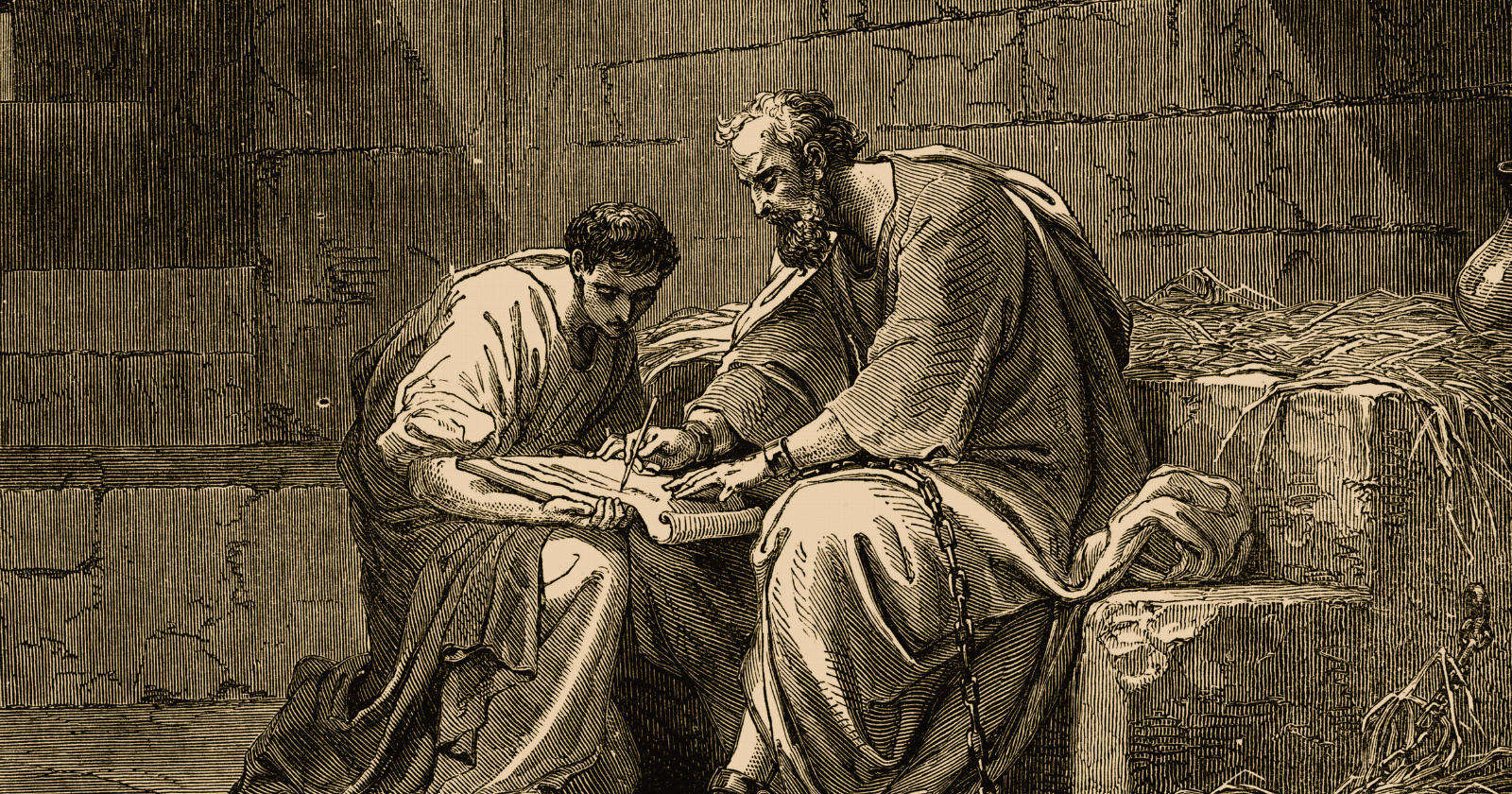In the Letter of St. Paul to Philemon, we uncover a profound message of compassion and forgiveness.
Paul writes to Philemon, a fellow Christian, urging him to reconcile with his estranged slave, Onesimus.
This brief correspondence reveals the early Christian values of love and restoration, transcending social norms of the time.
Within this article, we will delve into the key themes presented in this New Testament epistle. Let’s uncover the lessons it imparts for spiritual self-care and see how these ancient words can shape your daily decisions and relationships.
What is Paul trying to say in Philemon?
The Letter of Paul to Philemon stands as a testament to early Christian values, particularly the revolutionary appeal for equality and brotherhood beyond societal structures.
Paul, writing from prison, intercedes on behalf of Onesimus, a runaway slave who has become a Christian under Paul’s mentorship.
From the modern perspective, we can consider Paul’s epistle to Philemon as a masterclass in diplomacy, advocating for unity and dignity within the body of Christ.
At its core, this letter is a personal appeal for the freedom and brotherly acceptance of Onesimus, who has wronged his master, Philemon.
Through Paul’s words, we see a powerful example of Christian intercession and the transformative nature of faith.
The letter’s structure is simple: a greeting, an expression of gratitude for Philemon’s love and faith, followed by Paul’s plea for Onesimus.
In this letter, the seeds for social equity are sown, aligning with Christian values that transcend time.
Main themes in the Epistle of Paul to Philemon
1) Equality and brotherhood
Paul’s letter transcends the cultural norms of his time by advocating for Onesimus’ return not as a slave, but as a beloved brother in Christ.
If you don’t remember the background, Onesimus (Colossians 4:9) had run away and found Paul imprisoned (1:10, 1:13), and became a convert under Paul.
Later, Paul decided to send him back to his master Philemon in Colossae in Asia Minor.
While this letter of Paul to Philemon may be brief, it is quite important, as it urges the treatment of slaves with brotherly love — a principle that will ultimately put an end to slavery, the custom of Roman times.
This theme of equality challenges the deep-rooted institution of slavery, positioning Christian love and kinship as forces that transcend societal hierarchies.
Paul’s request reflects an early Christian understanding that social status is secondary to spiritual brotherhood within the faith.
2) Christian love and forgiveness
Another central message in Paul’s message is the call for Philemon to forgive Onesimus and welcome him with love.
The letter emphasizes the transformative power of Christian love, which calls for forgiveness and restoration of relationships.
Paul intercedes not with authority but through a heartfelt appeal to Philemon’s conscience, demonstrating love’s potential to heal and reconcile.
Therefore, this call for reconciliation is a powerful reminder of the restorative nature of forgiveness in relationships.
3) Free will
Who would have thought that a letter from ancient times could so profoundly address the concept of free will?
But it’s true: Verse 14 speaks of free will.
In Paul’s appeal to Philemon, he brings this to light by stating, “but without your consent I wanted to do nothing” (Philemon 1:14).
This simple yet powerful line underscores a foundational Christian principle:
The respect for personal choice.
The thing is that Paul is hopeful to visit Philemon and for this, he asks him to keep a guest room for him (1:22).
Paul’s decision to send Onesimus back, seeking Philemon’s voluntary forgiveness and acceptance, illustrates a deep respect for autonomy.
This gesture not only highlights the dignity afforded to each individual but also portrays free will as a cornerstone of Christian love and fellowship.
Through Paul’s words, we’re reminded of the value placed on voluntary actions driven by faith and compassion, marking a significant departure from the era’s normative compulsions.
4) Personal transformation through faith
The story of Onesimus in Paul’s letter to Philemon is a great example of the power of personal transformation through faith.
Once a runaway slave, Onesimus becomes a pivotal figure through his conversion to Christianity, symbolizing profound personal change.
Paul’s words, “formerly he was useless to you, but now he is indeed useful to you and to me” (Philemon 1:11), highlight the transformative impact of faith.
This transformation is not just spiritual but practical, affecting how individuals are perceived and valued within their communities.
Paul’s depiction of Onesimus as now profitable to both himself and Philemon illustrates the belief in redemption and change through Christ.
In simple terms, it’s a powerful testament to the idea that faith can reshape lives and relationships.
5) Communal support in faith
The final greetings within the letter showcase the interconnectedness of the early Christian community.
In addition to Epaphras (who evangelized Colossae – Colossians 1:7) and the others, the Final Greeting is noteworthy as it identifies both Mark and Luke as Paul’s companions and fellow workers.
In fact, this letter acknowledges their collective effort in spreading the gospel.
This sense of community support serves as a reminder that the Christian journey is shared, bolstered by mutual encouragement and aid.
Paul’s actions reflect a genuine application of the teachings of Jesus—caring for the oppressed, seeking justice, and acting with compassion—demonstrating how faith intersects with everyday life and social issues.
Why does free will matter?
“But I preferred to do nothing without your consent in order that your goodness might not be by compulsion but of your own free will.”
Philemon 1:14
Paul’s letter to Philemon delves deeply into the Christian understanding of free will, particularly in how it relates to goodness and moral action.
Rather than demanding Philemon’s compliance, Paul appeals to his sense of voluntary choice.
This emphasis on free will highlights the notion that true virtue lies not in compulsion but in the freedom to choose what is right.
It is a powerful testament to the respect for individual agency within the context of Christian love and fellowship.
In particular, we encounter the idea of free will in Paul’s letter in the following ways:
- Paul respects Philemon’s autonomy.
- His words show that goodness should stem from one’s own volition.
- He’s an example of how moral actions gain value when chosen freely.
The nuance Paul brings to the discussion of free will and personal choice within the dynamics of master and servant reflects a broader philosophical conversation about the nature of freedom and ethical responsibility in the Christian life.
Why does this matter for Christians?
Let’s be honest: external pressures and societal norms often dictate our actions. However, the focus on free will invites Christians to act from a place of authenticity and personal commitment.
By choosing to live out their faith through free will, we can make impactful decisions that not only align with their beliefs but also contribute to a more compassionate and understanding world.
Can grace end slavery?
Paul’s epistle to Philemon is not just about the fate of one man — it’s a larger commentary on the institution of slavery.
By appealing to Philemon to accept Onesimus as a brother rather than a slave, Paul introduces the revolutionary Christian concept of equality, which doesn’t align with the prevailing social order.
This plea, grounded in Christian grace, hints at a future where slavery cannot coexist with genuine Christian practice.
Paul’s call for brotherly love serves as a subtle yet powerful challenge to the accepted norms of his day, suggesting that Christianity harbors the seeds for the eventual dissolution of slavery.
Final thoughts: Applying Philemon’s lessons
Hopefully, now you agree that the Letter of St. Paul to Philemon is not just a historical artifact — it’s a living document that speaks to the heart of Christian discipleship.
It invites us to reflect on our relationships and challenges us to act with grace and humility.
For someone seeking guidance on the next steps in their faith journey, Philemon encourages a deeper consideration of how we extend Christ’s love to others, especially those whom society might overlook or undervalue.
It’s a call to practice radical hospitality and to advocate for transformation within our communities.
So, embrace this epistle as a personal invitation to live out the Gospel in meaningful ways — by fostering reconciliation, affirming dignity, and embodying the unity we have in Christ.








